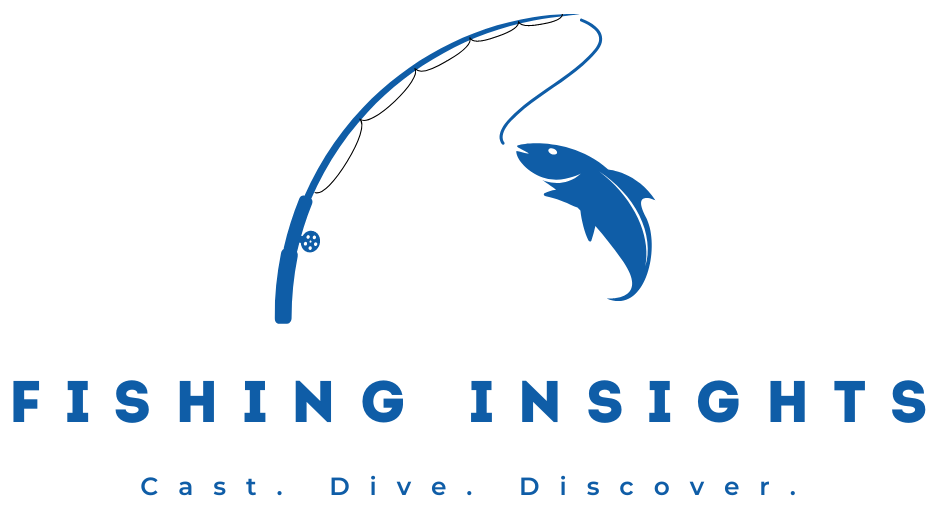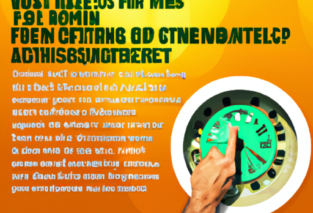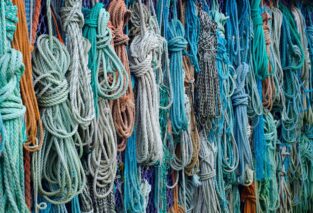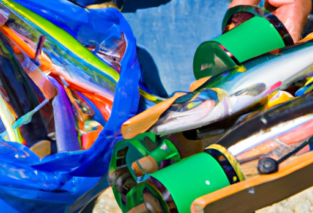Are you a newbie to the exciting world of fishing? If so, you may find yourself overwhelmed with what to pack for your very first fishing trip. Don’t worry, we’ve got you covered! In this article, we will highlight the essential items that every newbie should carry when heading out on a fishing adventure. From rods and reels to bait and tackle, we’ll ensure you have everything you need for a successful and enjoyable fishing experience. So grab your tackle box and get ready to embark on an unforgettable fishing trip!
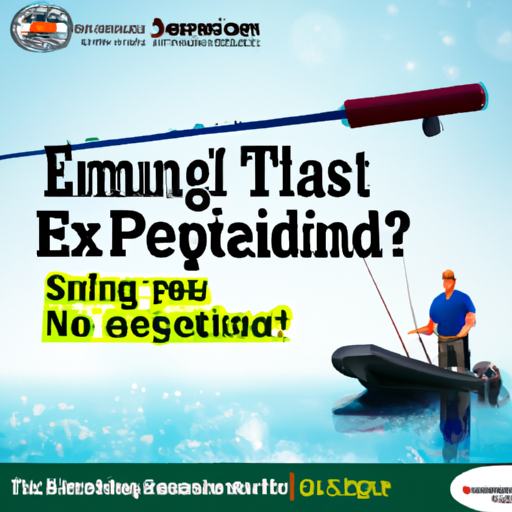
Clothing
Weather-appropriate clothing
When packing for a fishing trip, it’s crucial to consider the weather conditions you’ll be facing. Dressing appropriately will not only keep you comfortable but also protect you from the elements. If you’re heading out on a sunny day, lightweight and breathable clothing, such as a moisture-wicking shirt and shorts, will help you stay cool. Alternatively, if you’re expecting colder temperatures, layering is key. Bring a warm jacket or sweater that you can easily remove if you get too warm.
Waterproof gear
Waterproof gear is a must-have for any fishing trip, as you’ll likely be spending a good amount of time near or in the water. Investing in a waterproof jacket and pants will keep you dry during unexpected rain showers or splashes from the lake. Don’t forget to pack waterproof boots or waders to ensure your feet stay dry as well. These will also provide traction and protection while maneuvering on wet or slippery surfaces.
Sun protection
Spending hours under the sun without proper protection can ruin the fun of your fishing trip. Pack sunscreen with a high SPF rating to shield your skin from harmful UV rays. Opt for a broad-spectrum sunscreen that offers protection against both UVA and UVB rays. Additionally, a hat with a wide brim will help shade your face and neck from direct sunlight. Don’t forget to bring a pair of polarized sunglasses to protect your eyes from the sun’s glare, allowing you to spot fish more easily.
Fishing Equipment
Rod and reel
The cornerstone of any fishing trip is the rod and reel. When choosing a fishing rod, consider the type of fishing you’ll be doing and the species you’ll be targeting. For beginners, a medium-action spinning rod is versatile and easy to handle. Pair it with a spinning reel that matches the rod’s specifications, and you’re good to go.
Fishing line
A strong and reliable fishing line is essential for a successful fishing trip. Monofilament lines are popular among beginners as they are versatile and cost-effective. Alternatively, if you’re planning to fish in areas with heavy cover or targeting larger fish, consider using braided fishing line for increased strength and sensitivity.
Hooks and lures
Having a variety of hooks and lures in your tackle box will allow you to adapt to different fishing conditions and target various species. Make sure to pack an assortment of hooks in different sizes, as well as a selection of lures that mimic the prey of the fish you’re targeting. Additionally, don’t forget to bring some sinkers and bobbers to adjust the depth at which your bait or lure is presented.
Tackle box
A well-organized tackle box is essential for keeping your fishing gear neat and easily accessible. Look for a tackle box with multiple compartments to store your hooks, lures, and other small fishing accessories. It’s helpful to label each section to quickly locate specific items when you need them. Consider investing in a waterproof tackle box to protect your gear from water damage.
Bait
Choosing the right bait can significantly increase your chances of catching fish. Live bait, such as worms or minnows, is a popular choice that appeals to a wide range of fish species. However, if you prefer to use artificial bait, pack a variety of soft plastic lures and hard baits in different colors and sizes. Experimenting with different baits will help you determine what works best in different fishing scenarios.
Fishing net
A fishing net is a valuable tool for landing and handling fish, especially if you’re planning to catch larger species. Look for a net with a deep and wide hoop, as it will be easier to maneuver and allows for a better chance of successfully netting the fish. Make sure the net has a soft mesh to prevent damaging the fish’s delicate scales.
Safety and Navigation
Personal flotation device
Safety should always be a top priority when going out on the water. Wearing a personal flotation device (PFD) is crucial, even if you’re a strong swimmer. A PFD will provide buoyancy and keep you afloat in case of an accidental fall or capsizing. Make sure you choose a PFD that fits properly and is approved by relevant safety regulations.
First aid kit
Accidents can happen anywhere, and having a fully stocked first aid kit is essential for handling minor injuries while you’re out fishing. Your first aid kit should include adhesive bandages, antiseptic wipes, gauze pads, adhesive tape, pain relievers, and any personal medications you may need. It’s also a good idea to include a first aid manual or guide to assist in emergency situations.
Whistle
A whistle is a simple yet effective tool for attracting attention and signaling for help in case of an emergency. Attach a whistle to your PFD or carry it on a lanyard around your neck for quick and easy access. Remember to familiarize yourself with the international distress signal (three short blasts) in case you ever find yourself in a distress situation.
Compass
A compass is an essential tool for navigation and orientation, especially if you’re fishing in unfamiliar territory. It will help you determine your direction and find your way back to safety if you get disoriented. Make sure to pack a reliable compass and familiarize yourself with how to use it before your fishing trip.
Maps
Carrying detailed maps of the fishing area is a smart strategy to ensure you stay on track and know the layout of the waterways. The maps should provide information on important landmarks, depth contours, and potential hazards. Familiarize yourself with the maps beforehand to plan your fishing spots and to have a general understanding of the surrounding area.
GPS device
Investing in a portable GPS device can be tremendously helpful for navigation, especially if you’re fishing in vast or remote areas. A GPS device enables you to mark waypoints, track your route, and pinpoint locations of interest. Make sure to bring spare batteries or a portable charger to ensure your GPS device stays powered throughout your fishing adventure.
Flashlight
A reliable flashlight is an essential item to include in your fishing gear. It comes in handy during early morning or late evening fishing trips, or during unexpected situations after dark. Opt for a waterproof and durable flashlight with a long battery life. Consider using LED flashlights, as they are brighter and more energy-efficient than traditional incandescent flashlights.
Food and Water
Drinking water
Staying hydrated is crucial during a fishing trip, especially when spending hours under the sun. Ensure you have an ample supply of drinking water to keep you hydrated throughout the day. Consider carrying a reusable water bottle to minimize waste and make refilling easier. If you’re unsure about the cleanliness of the water at your fishing location, it’s recommended to bring a water purifier or water purification tablets.
Snacks
Packing a variety of snacks will keep your energy levels up and stave off hunger during your fishing adventure. Choose snacks that are lightweight, non-perishable, and easy to eat. Energy bars, trail mix, jerky, and fresh fruits are great options to consider. Avoid snacks with strong odors that may repel fish or attract unwanted wildlife.
Cooler
If you plan on catching fish and keeping them fresh, a cooler is a must-have item. A cooler will help preserve your catch and ensure it stays cold until you can properly clean and cook it. Look for a cooler with thick insulation and a secure lid to keep the cold air trapped inside. Don’t forget to pack ice or ice packs to maintain the desired temperature inside the cooler.
Utensils
Having the appropriate utensils will make mealtime easier and more enjoyable. Pack a set of reusable cutlery, including a knife, fork, and spoon. Additionally, bring a plate or bowl, as well as a mug or cup for hot beverages. If you’re planning to cook, don’t forget to include cooking utensils such as a spatula or tongs.
Cooking equipment
If you’re considering cooking your catch or preparing meals during your fishing trip, make sure to bring the necessary cooking equipment. A portable camp stove is a convenient option for preparing simple meals, boiling water, and brewing coffee. Don’t forget to pack pots, pans, and a propane fuel canister if required. Remember to follow safety guidelines when cooking in a camping environment.

Camping Gear
Tent
If you plan on spending the night in the great outdoors, a reliable tent is a must-have item. Choose a tent that suits the number of people in your group and offers adequate protection against the elements. Look for features such as waterproof material, sturdy construction, and proper ventilation for maximum comfort during your camping experience.
Sleeping bag
A comfortable sleeping bag will ensure a good night’s rest after a day of fishing. Consider the expected temperatures at your camping location and choose a sleeping bag with the appropriate temperature rating. Look for a bag that is lightweight, easy to pack, and provides insulation to keep you warm throughout the night. Don’t forget to bring a sleeping pad or air mattress for added comfort.
Camp stove
Having a camp stove allows you to cook meals and boil water conveniently during your camping trip. Look for a portable camp stove that is easy to set up and operate. Make sure it is compatible with the type of fuel you plan to use, such as propane or butane. Remember to adhere to safety precautions when operating a camp stove in a camping environment.
Lantern
A lantern is essential for providing light during your camping trip, particularly at night. Look for a lantern that is durable, water-resistant, and provides sufficient brightness for your needs. LED lanterns are a popular choice as they are energy-efficient and offer a longer battery life. Consider bringing extra batteries or a rechargeable lantern to ensure you have ample light throughout your camping experience.
Firestarter
Building a campfire not only provides warmth but also creates a cozy ambiance for a true camping experience. Pack a reliable firestarter, such as waterproof matches, a butane lighter, or a fire starter kit, to easily ignite your campfire. Additionally, learn about any fire restrictions or regulations in the area and follow proper fire safety practices.
Camping chair
A comfortable camping chair is a great addition to your camping gear. It provides a place to relax and unwind after a long day of fishing. Look for a chair that is lightweight, collapsible, and easy to transport. Consider chairs with additional features such as cup holders and side pockets for added convenience.
Camp table
A portable camp table comes in handy for meal preparation, dining, or as a convenient surface to place your fishing gear. Look for a sturdy and compact table that folds easily for storage and transportation. Ensure it is large enough to accommodate your needs, whether you’re cooking meals or playing card games with your fellow campers.
Tools and Accessories
Multi-tool
A versatile multi-tool is an all-in-one tool that can tackle many tasks while fishing or camping. Look for a multi-tool that includes pliers, a knife, screwdrivers, scissors, and other useful tools. Having a multi-tool will come in handy for various situations, such as repairing fishing gear, opening cans, or performing small DIY tasks around the campsite.
Knife
A sharp and reliable knife is an essential tool for any fishing trip. Choose a fishing knife that’s suitable for your needs, whether it’s filleting fish, cutting bait, or performing general camping tasks. Look for a knife with a corrosion-resistant blade and a comfortable grip. Remember to handle your knife safely and keep it securely stored when not in use.
Pliers
Fishing pliers are a versatile tool that helps you remove hooks, crimp split shot weights, or cut fishing line. Look for pliers with a corrosion-resistant coating and a split ring tool for easy lure and bait changes. Opt for pliers with built-in features such as line cutters or hook removers to save space in your fishing bag.
Line cutter
A line cutter is a convenient tool specifically designed to cut fishing line quickly and efficiently. It’s a compact and easy-to-use tool that saves you the trouble of struggling with traditional scissors or knives. Choose a line cutter that is lightweight, rust-resistant, and has a retractable design for safety.
Tackle organizer
Keeping your fishing gear organized is essential for easy access and efficient fishing. A tackle organizer with multiple compartments and adjustable dividers will help you sort and store your hooks, lures, and other small accessories. Look for a tackle organizer that is durable, waterproof, and easy to carry, whether it’s a tackle box, bag, or backpack.
Fishing bag
A fishing bag is a convenient way to carry and transport your fishing gear. Look for a bag that offers multiple compartments and pockets for organized storage. Consider the size and capacity of the bag to ensure it can accommodate all your essential fishing equipment. Choose a bag with comfortable shoulder straps or handles for easy carrying.
Fishing hat
Protecting yourself from the sun is crucial during a fishing trip, and a fishing hat can provide shade and reduce the risk of sunburn. Look for a hat with a wide brim that can shield your face, neck, and ears from the sun’s rays. Consider hats made from materials with UPF (Ultraviolet Protection Factor) rating for enhanced sun protection.
Sunglasses
A good pair of sunglasses is essential for both eye protection and enhanced visibility while fishing. Look for sunglasses with polarized lenses to reduce glare and improve visibility in the water. Choose sunglasses that provide 100% UVA and UVB protection to safeguard your eyes from the sun’s harmful rays. Don’t forget to bring a sunglasses strap to prevent them from falling into the water.
Electronics
Mobile phone
A mobile phone is a valuable tool for communication and safety during your fishing trip. Make sure your phone is fully charged and protected in a waterproof case or pouch. Additionally, download fishing apps or maps to assist with navigation and identifying fishing spots. Remember to put your phone on silent or airplane mode to conserve battery life and minimize distractions.
Portable charger
Having a portable charger ensures you can keep your electronic devices powered even when you’re away from electrical outlets. Look for a portable charger with a high capacity and multiple charging ports. Consider investing in a solar-powered charger for an eco-friendly option that harnesses the sun’s energy to charge your devices.
Camera
Capturing the memories of your fishing trip is essential, and a camera can help you preserve those special moments. Whether it’s a standalone camera or the camera on your mobile phone, make sure to have a reliable way to document your fishing adventures. Don’t forget to pack spare batteries or ensure your camera is fully charged before heading out.
Personal Hygiene
Soap
Maintaining personal hygiene is important, even during a fishing trip. Pack a small container of biodegradable soap for washing your hands and body. It’s essential to use biodegradable soap to minimize any negative impact on the environment when washing near or in bodies of water.
Toilet paper
When nature calls, having toilet paper readily available is a necessity. Pack toilet paper in a waterproof bag or container to keep it dry and easily accessible. Remember to practice proper Leave No Trace principles and properly dispose of used toilet paper.
Hand sanitizer
Keeping your hands clean is essential for preventing the spread of germs, especially when handling bait, fish, or food. Pack a travel-sized bottle of hand sanitizer to ensure you can clean your hands when soap and water are not readily available. Look for hand sanitizers with at least 60% alcohol content for effective sanitation.
Towel
Having a small towel or microfiber towel is useful for various purposes during your fishing trip. It can be used to dry off after swimming, wipe off sweat, or clean your fishing equipment. Choose a quick-drying towel that is compact and lightweight for easy packing and transportation.
Licenses and Permits
Fishing license
Before you embark on your fishing trip, make sure you have the necessary fishing license for the area you plan to fish in. Fishing licenses are typically issued by the local Fish and Game department and help support conservation efforts and maintain fish populations. Ensure your fishing license is valid, and carry it with you at all times while fishing.
State permits
In addition to a fishing license, certain fishing locations may require additional permits or passes. Research and check if there are any state-specific permits or passes required for the particular lake, river, or fishing zone you plan to visit. Failure to comply with these regulations may result in fines or penalties.
Miscellaneous
Cash
Carrying some cash is always a good idea, especially when you’re away from civilization and may not have access to card payment options. Cash can come in handy for emergency situations, purchasing supplies from local vendors, or paying for amenities at camping sites.
ID
Bringing a valid form of identification, such as a driver’s license, is essential while on a fishing trip. It’s important to have identification readily available in case it’s required when purchasing fishing licenses, permits, or when encountering authorities.
Bug spray
Protecting yourself from pesky insects is crucial, especially during summer fishing trips when mosquitoes and other insects are prevalent. Always carry insect repellents or bug spray with DEET to keep bugs at bay. Apply it to exposed skin and clothing to minimize the risk of insect bites or stings.
Sunscreen
Don’t let a sunburn ruin your fishing trip! Apply a broad-spectrum sunscreen with a high SPF rating to protect your skin from harmful UV rays. Remember to reapply every few hours, especially if you’re fishing in water, as sunscreen can wash off. Sunburns not only cause discomfort but can also lead to more serious health issues in the long run.
Fishing guide or book
If you’re a fishing newbie or exploring a new fishing spot, a fishing guide or book can provide valuable information and tips. Look for guides that cover the local fish species, fishing techniques, and recommended fishing spots. Reading up beforehand can enhance your fishing knowledge and increase your chances of success.
As a newbie preparing for your first fishing trip, it’s important to pack the essentials to ensure a successful and enjoyable experience. By following this comprehensive guide, you’ll be well-prepared with the necessary clothing, fishing equipment, safety tools, and camping gear. Remember to check local regulations, acquire the required licenses and permits, and practice responsible fishing and camping practices. So grab your gear, head out into nature, and create unforgettable fishing memories!
